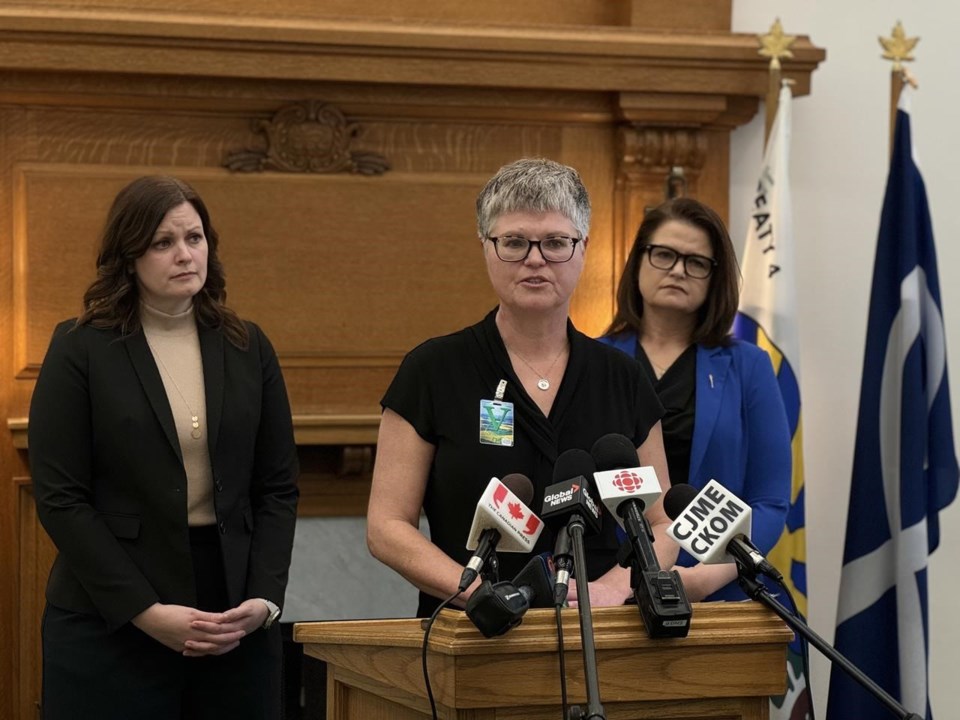REGINA — Nadine Baker says she has been waiting 10 months for a diagnostic scan to see whether she has breast cancer.
The Regina woman said Monday she was referred for a diagnostic test in March and an appointment still hasn't been booked.
"It's a constant worry because I saw my mom go through breast cancer. I know what the picture looks like," Baker told reporters.
"The sooner you get diagnosed, we know the better your outcomes."
The Opposition NDP invited Baker to the legislature to share her concerns and show wait times in the province have skyrocketed for breast cancer care.
The province has said average wait times for scans should be three weeks. But most are instead waiting about 10 weeks.
"Women in this province are sick and tired of waiting. They're sick and tired of excuses," NDP Opposition Leader Carla Beck said.
"Saskatchewan is the birthplace of Canadian-style, public health care. And good cancer care here at home should not be too much to ask."
Wait times for mammograms and breast cancer surgeries in Saskatchewan have been growing due to short staffing. There are fewer medical technologists and surgeons than what's needed.
The Saskatchewan Health Authority said last year four breast cancer surgeons worked in the Regina, with one of them planning to go on temporary leave. In 2018, the city had seven surgeons.
There were seven breast cancer surgeons in Saskatoon as of last year, the authority said. In 2018, there were eight.
Regina surgeon Dr. Suzanne Meiers said in a memo in the fall, which was obtained by The Canadian Press, that she is pausing new referrals for breast cancer surgery until patients have access to timely diagnostics.
The memo said the surgeon would continue to care for breast cancer patients who have already been referred to her and are on her wait list. She will also accept referrals for all other surgical needs, it said.
Meiers declined to comment further when reached by The Canadian Press.
Staff are also doing fewer scans than they used to.
A Saskatchewan Cancer Agency report says more than 28,400 people were screened for breast cancer last year, about 7,200 scans less than the 35,600 performed four years ago.
Baker said the system is broken.
"How many are going to find out too late? Am I going to find out too late?"
She said she watched her mother battle breast cancer years ago. She lost her left breast and lymph nodes on that side, she said.
"It took her away for many months from her family. And it's just a worry because not having it taken care of immediately and as quick as possible can mean that you're not there after the fact."
To deal with the backlog, Health Minister Everett Hindley has said the province plans to send patients to a private clinic in Calgary to do 1,000 scans.
He said the Saskatchewan Health Authority has also extended clinic hours in Saskatoon to deal with additional volumes from Regina.
Hindley added that the province is looking to expand diagnostic volumes in Moose Jaw and is continuing to hire more staff.
The NDP has questioned the Calgary plan after the clinic donated to the governing party and hired a former finance minister to lobby on its behalf. Hindley has said the donations and lobbying did not influence the government.
NDP health critic Vicki Mowatt said other private clinics and the public system can do them more affordably.
Mowat said the province needs to retain health-care workers. Many are offering solutions, but the government isn't listening, she said.
She added the province should have an "all hands on deck" approach, which includes better compensating clinics so they can operate on late nights and weekends.
This report by The Canadian Press was first published Jan. 22, 2024.
Jeremy Simes, The Canadian Press



